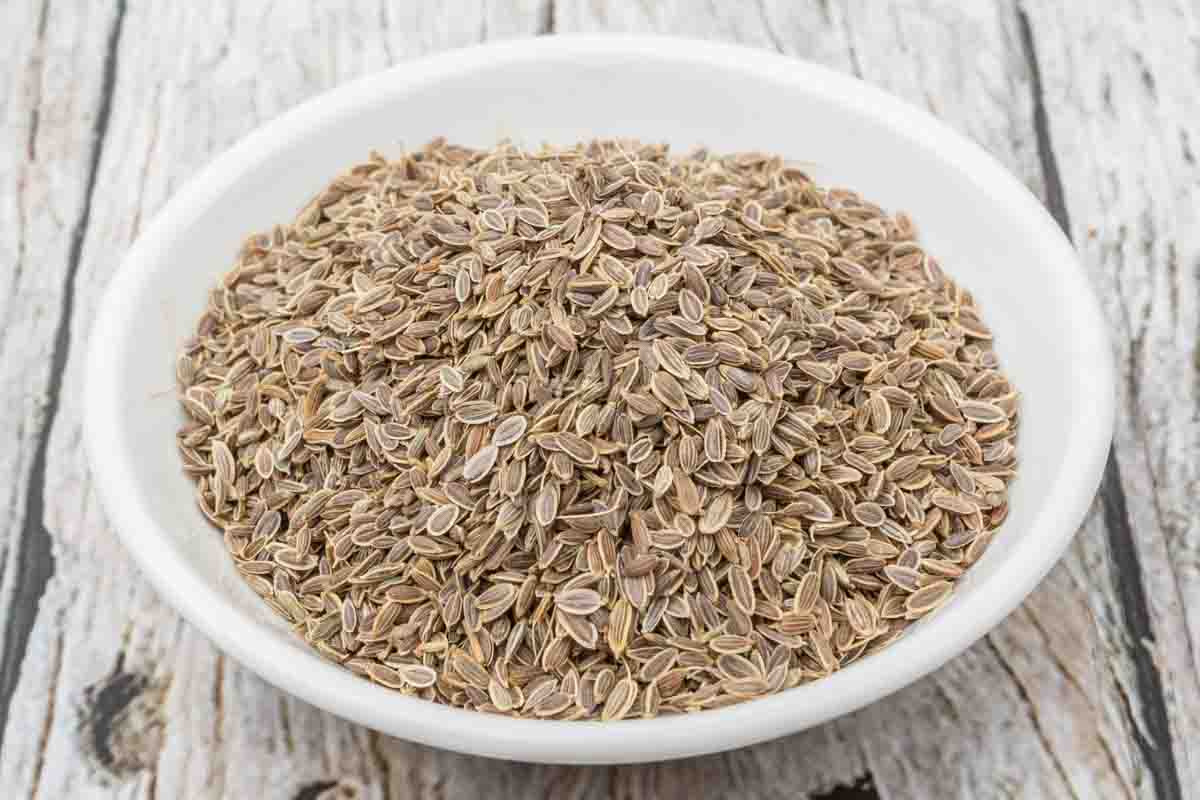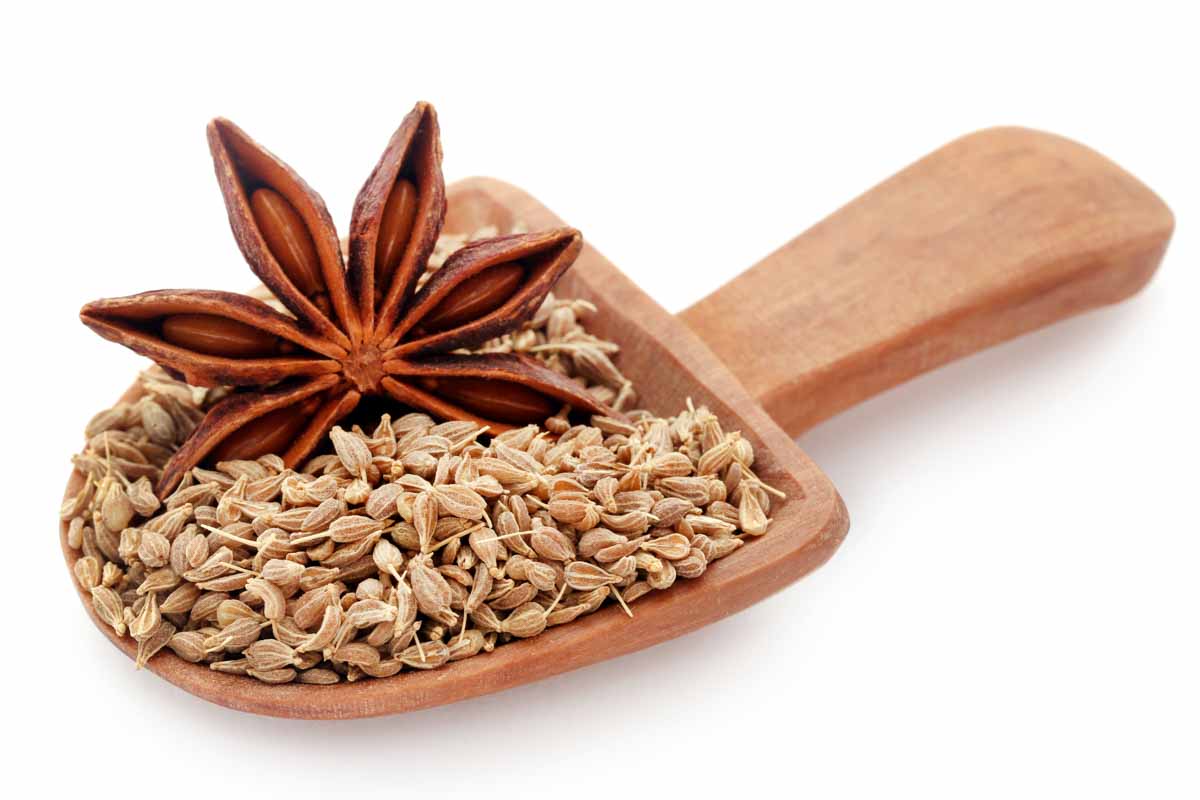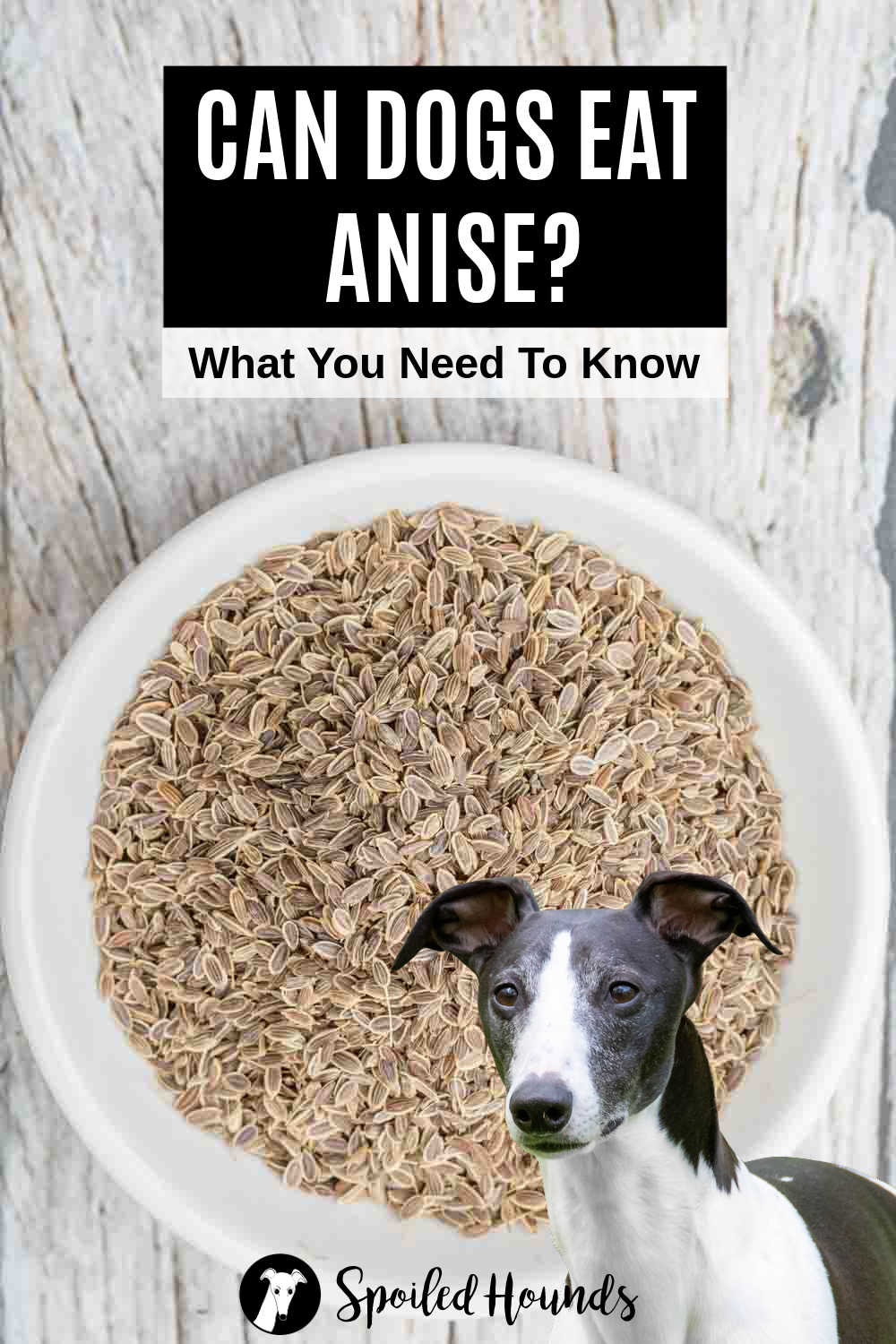Used in cookies and baked goods, this herb tastes like licorice. But, can dogs eat anise? Read this guide before sharing it with your pup.
Whether they are growing the herbs or eating cookies made with anise, many dog owners wonder if sharing with their fur babies is safe. Let’s take a closer look at what anise is and how dogs react to it.

For ultimate pet safety, please ask your vet any questions you have regarding your dog eating anise.
What Is Anise
Anise has the scientific name of Pimpinella anisum and is also called aniseed. The anise plant grows naturally in the eastern Mediterranean region. It is in both the mint family and parsley family. In fact, its closest plant relatives are cumin, dill, caraway, and fennel.
Shockingly, it’s not related to star anise at all (read more below about how they are different).
Anise has a licorice-like flavor, and when people cook with it, they use the seeds or ground-up seeds.
In addition to its health benefits, it’s also used in herbal medicine to combat depression and protect against stomach ulcers.

Anise vs Star Anise
Anise seeds and Star Anise come from two different plants that are grown in different parts of the world. Even so, they both have the same licorice flavor because they both contain the essential oil anethole.
Star anise has a stronger and more bitter taste and is often used in Chinese or Asian recipes.
Anise Mint
Anise Hyssop is also called licorice mint. It’s a decorative herb that is used in potpourri because it is so aromatic.
Anise Extract vs Anise Oil
Both anise extract and anise oil are commonly made from star anise, not anise seed. So, if you really need to use anise seed extract, make sure it is listed as anise seed on the label.
The biggest difference between oils and extracts is that the essential oil is more pure. It’s basically the chemicals that are responsible for the plant’s distinct flavor or aroma.
Extracts are essential oils that are diluted in some kind of alcohol. That makes them less potent.

Can Dogs Have Anise
In this guide, I will be talking about aniseed, not star anise (unless I mention it by name). The American Botanical Council states that Chinese star anise is safe in small quantities, but Japanese star anise is toxic to dogs.
Since they look similar, it’s best to keep both types away from your pet.
Anise Seed comes from an entirely different plant, and it is safe for dogs to eat. In fact, Vet Organics calls it catnip for dogs.
There are a lot of good things that anise seed extract can do for pets. Some pet owners use it in treats to motivate their dogs. Others will use it to holistically treat congestion, cough, or respiratory issues.
Just like with other types of new food, only give your dog a little bit and see how they react to it. If they show any signs of negative sections, stop giving them to your pet.
Anise Seed And Dogs
The use of anise varies and you should always contact your veterinarian before trying to treat any health issues – no matter how minor – with herbs.
Some people use aniseed to improve their dog’s skin issues or to calm a digestive upset. How much you use depends on what type (oil or extract) and the size of your dog. Talk to your veterinarian to find out how much to give your dog.
Is Anise Safe For Dogs
Yes, it is safe to give your dog anise in very small amounts. How much is small amounts? Well, that depends on your dog’s size and how they react to this aromatic herb.
You’ll know you have given your dog too much if they vomit or have diarrhea. Start out with basically a drop of extract on a dog treat or sprinkle just a few seeds on a dog toy to see how they handle it.
Anise is safe for dogs in the right quantities.
Is Anise Good For Dogs
There are a few different ways that you can use anise for dogs. Since it has such a strong aroma, some people like to use it to nose train.
Other dog owners might use small amounts of aniseed as dog catnip to energize them. Then, after the burst of energy, they might get sleepy.
Health Benefits
As of today, there isn’t any scientific evidence to support any health benefits of anise for dogs. There also aren’t any studies that show that it’s a good idea to use it as an herbal remedy. This is why it’s important to talk to your vet if you want to use it to treat health issues.
Is Anise Harmful To Dogs
It’s all about dosing. Large quantities of anise can cause digestive issues like upset stomach or vomiting. There are other potential risks associated with dogs eating too much of it.
Eating too much aniseed can be very dangerous for a dog’s nervous system. It could cause a low heart rate, make your dog go unconscious, or even die. If you notice your dog’s breath rate decreasing, please contact your vet immediately.
Can Dogs Eat Anise Cookies
The biggest danger of anise cookies isn’t the anise, but the sugar and calories. Dogs that eat large amounts of sugar are at a higher risk of obesity. And obese dogs are at risk for heart disease and diabetes.
The following cookies are flavored with anise extract or are made with anise seeds, so they are safe for dogs to eat a few bites.
- Anginetti Cookies
- Pizzelles
- German Anise Cookies

Catnip Equivalent For Dogs
Aniseed is commonly called dog nip or catnip for dogs because it has a stimulating effect. Just a few seeds in a toy can make dogs hyperactive. And the results vary from dog to dog. Your furry friend might get energetic or they might not react at all.
Start out with just a few seeds or a tiny drop of aniseed oil on a toy. It doesn’t take much! Be very careful, because too much dog nip could cause respiratory problems like trouble breathing.
Anise For Dogs
Until you know how your dog will react to it, don’t add it to your dog’s food. It’s better to buy an anise dog toy, or supplements from pet stores, or add some seeds or extract to homemade treats.
Check out this recipe for anise dog treats.
Other Places To Find Anise
There are other places you’ll find anise – in aromatics and in anise baking. Dogs are really sensitive to aromas, so only use mild candles around them.
And if you make muffins or anise biscotti with anise seed, only share a little bit with your pup. Dogs that eat too much sugar or carbs are at a greater risk of unhealthy weight gain.
Final Thoughts
As you can see, whole or ground anise seed and aniseed essential oil are safe for your pets. But you must be very careful with the dosing. Please consult your veterinarian to find out how much your dog can handle and whether it can help them.
More Dog Food Resources
What other human foods are safe for dogs? Here are some more resources about different spices and herbs dogs can and can’t eat:
- Can Dogs Eat Basil
- Can Dogs Eat Cilantro
- Can Dogs Eat Cumin
- Can Dogs Eat Oregano
- Can Dogs Eat Rosemary
- Can Dogs Eat Sage
- Can Dogs Eat Thyme
Find lots of information about human food dogs can eat (and ones they can’t) here on Spoiled Hounds!
📌 Pin this to save and share 📌


Leave a Reply